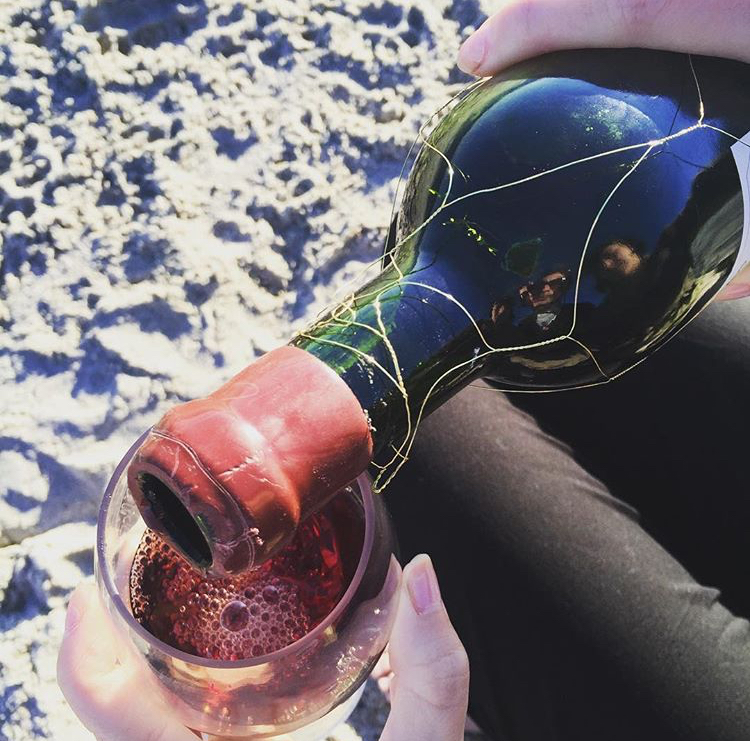There are moments when you drink a wine that become hand-wringing, bell-ringing events; transcendent moments that palpitate the nerve-endings and lodge in your memory cortex forever. When we post about an experience on Insta, Twitter or FB, the experience is flattened out. No #hastag, after all, can resurrect the quality of the sublime. I have drunk a few wines recently that have stirred the butterflies of the imagination and made me consider how a wine has the capacity to make us reach inside ourselves. This consideration begs a lot of questions, many of which I pose below, without answers at this stage, although some of the questions have answers implied in their very phrasing.

How do the physical, reflexive responses to wine manifest at a neurological level?
How do we process information, for example, when we look at wine in a glass? What is going on? To what extent do we start to judge the wine on its appearance alone? If so, why do we do it? Is it something primal, or part of our prior wine education? Or both? Do we start to calibrate our response at that point?
And with smell (and what is going on – neurologically – when we smell a wine?). Is there really a pathway between the olfactory bulb and the part of the brain that stores memories? Are these memories, or associations, images, triggered by the smells?
Why do different people respond so differently to the same wines? Is it due with their differing abilities to discern smells, or to do with their ability to process and evaluate sensory information?
Does a wine qua wine possess objective properties? Some wines never present the same way two times running. Would you define “mutability” as an objective/inherent property of the wine? What are the core objective properties of any given wine? Is objectivity ever really possible, given that it is filtered through a human being? And is objectivity not a taught thing, a set of instructions given to analyse wine in a specific way – and is this not itself partial, a kind of cultural conditioning?
Where does subjectivity come into this? Where (at what point) do our previous experiences (in life, in wine) come into our assessment of a particular wine? Is our response to wine a mixture of left and right side of the brain – analytical, on the one side, intuitive/emotional on the other? Or, is this a bit too formulaic? Are subjectively-loaded responses to wine less valid that objectively-arrived-at ones?
Where does like/dislike/neutrality of wine come from? Is it from our experience – a hierarchical judgement based on the perception of quality, or is it something more primitive – finding certain tastes inherently dislikeable? How is it that we can also overcome our instinctive responses and come to appreciate quality even if we don’t actually like to drink the wine itself?

An epiphany may be described blinding moment of realisation. A flash of insight. What’s behind this? Is it a momentary understanding that leads to a massive alteration in one’s viewpoint/appreciation of a wine? Are there shades of epiphany? Not every experience can be a transcendent one, after all, but many will be illuminating or simply joyful.
Can epiphanies arise from an inner need for something? In other words, will a certain personality type have a greater propensity for epiphanies? Or will they readily come to those who are mindful or spiritual? Or, are they open to all, rooted in the moment/serendipitous, a confluence of happy circumstances?
My wine epiphany stemmed from a general ignorance of – and innocence about – wine. Then, drinking from a bottle under the stars, I felt a relationship between the sublime context (starry skies, shooting stars, nature in full pomp), the wine itself, and my role as someone who was experiencing this and feeling intoxicated by the experience.
Why can I remember this experience so vividly nearly 40 years on, down to the actual flavour of the wine, when I forget things that happened that happened yesterday? How can the thought of a wine or the place in which an epiphany took place, transport us back to the moment? Presumably, smells and tastes also unlock these memories?
Most of my wine epiphanies have been shared experiences. Indeed, the fact that they were shared has seemingly been an intensifier of that experience. The person/people I was with on each occasion responded to the wine in that context in a similar way. Is it because humans are social animals that we seem to feed off each other’s responses and create a mutual story that we can refer to again and again?
I still have epiphanies, although rather than being one experience that redefines my relationship with wine, it seems to about refreshing my relationship with wine.
Whilst every individual will experience the pleasure that a wine gives in a way that is individual to them, cannot also the pleasure of social interaction help elevate the experience to another level?
I still have epiphanies, although rather than being one experience that redefines my relationship with wine, it seems to about refreshing my relationship with wine. Usually, it involves being caught unawares, having no/low expectations, and then suddenly being hit by the sensation of something extraordinary. What is it – at a neurological level – to be open, a tabula rasa, in effect?
Someone described their first natural wine epiphany as a “below the neck experience”, in that the experience of drinking a wine satisfied a hunger at that precise moment. The wine in question was so “devourable” that it consumed the consumer. Such is pleasure, that it was almost experienced in the stomach.
Wine pleasure is somewhere between the alimentary and cascades of firing neurons. Whatever the science is, the result can be physical, poetical or spiritual and any combination thereof.

